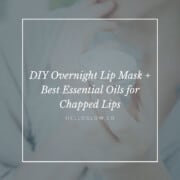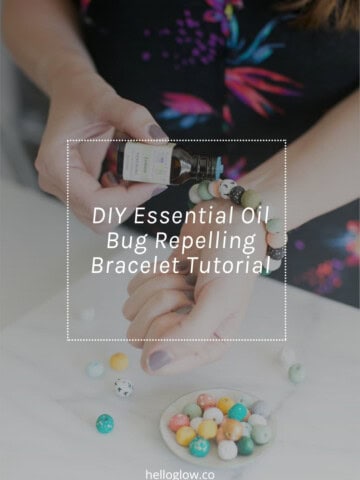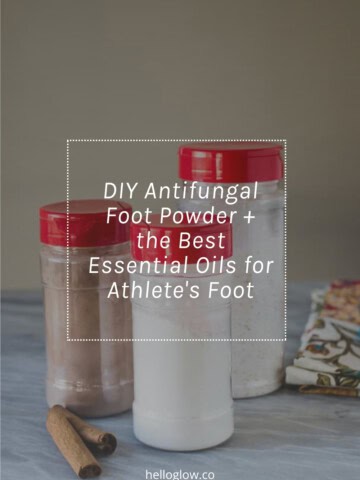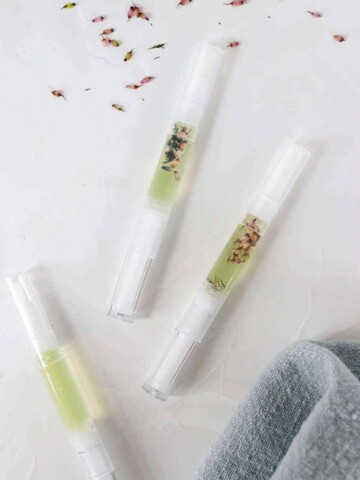Discover the best essential oils for chapped lips along with easy ways to incorporate them into your DIY beauty routine. Each oil brings unique benefits to nourish, hydrate, and enhance your lips naturally.
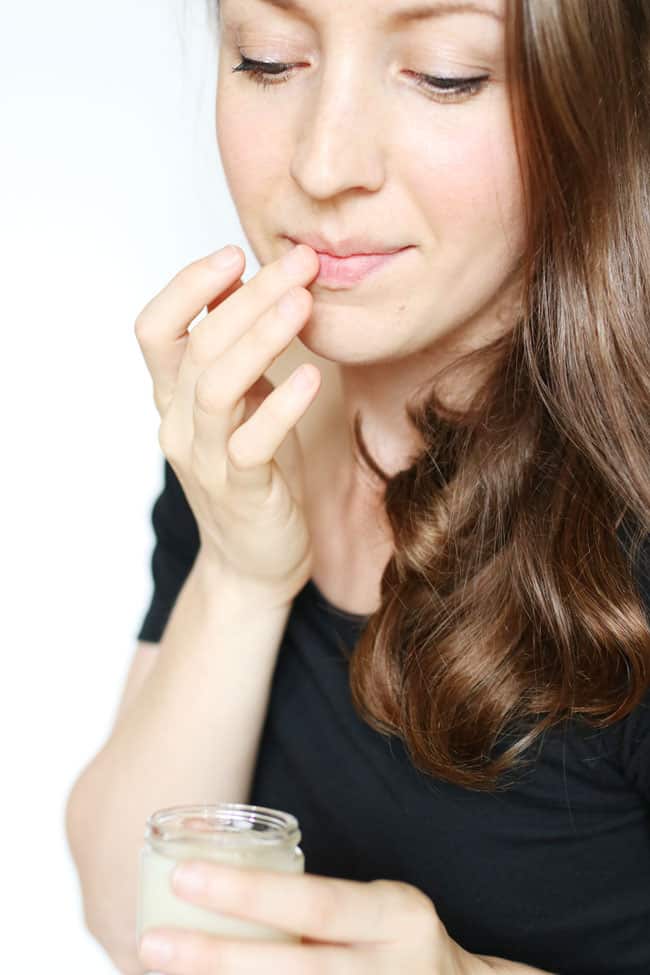
Who wants hydrated, lush lips all year long? Not sure which essential oil for chapped lips works best? We’ve got you covered! These quick and easy DIYs with lip-loving essential oils will keep chapped lips at bay!
Jump to:
- Why Essential Oils Are a Game-Changer for Your Lips
- Are Essential Oils Safe for Lips?
- How to Use Essential Oils in Lip Recipes
- 10 Best Essential Oils for Lips
- 1. Carrot Seed Essential Oil
- 2. Lavender Essential Oil
- 3. Rose Essential Oil
- 4. Blue Tansy Essential Oil
- 5. Tea Tree Essential Oil
- 6. Chamomile Essential Oil
- 7. Geranium Essential Oil
- 8. Peppermint Essential Oil
- 9. Vanilla Essential Oil
- 10. Sweet Orange Essential Oil
- Essential Oils To Avoid For Your Lips
- FAQ
- References
Why Essential Oils Are a Game-Changer for Your Lips
There are endless benefits to working with essential oils for lips. You can easily incorporate them into your skincare regimen for softer, smoother lips:
- Certain essential oils can hydrate the skin. They can prevent transepidermal water loss and help the epidermal barrier work better.
- Essential oils have been known to be an effective treatment against inflammation, being able to treat chapped lips.
- Some essential oils can have a soothing effect on the lips, reducing the pain and discomfort caused by dryness.
- Using essential oils on your lips can prevent infection as they possess antibacterial, anti-parasitic, antiseptic, antifungal, and antioxidant properties.
Are Essential Oils Safe for Lips?
Yes! The essential oils we suggest in the following paragraphs are safe for your lips.
Tips for Using Essential Oils on Lips
- Dilute, dilute, dilute: Always dilute essential oils with a carrier oil like coconut, almond, or jojoba before applying to lips.
When used correctly and diluted in the right carrier oil, they can be hydrating and can help you deal with various problems like dryness. Blending and applying the essential oils topically in a carrier oil (like the almond oil and honey combination we recommend here) is the best way to avoid any skin irritating reaction.
- Limit usage: Limit to 1–2 drops per recipe to avoid irritation, as lips are highly sensitive.
A little goes a long way with essential oils, as they are the highly concentrated essences of plants. This is why you don’t need a lot when creating a DIY!
- Use the right oils: Avoid phototoxic and sensitizing oils
It’s also important to remember that there are some oils you should avoid putting on your lips. Some oils are phototoxic and are not recommended for your lips. The fact that they’re phototoxic means that they can make your skin more sensitive to UV rays.
Similarly, sensitizing essential oils are not the best as they may lead to skin itching, irritation, and redness.
- Patch test first: Perform a patch test on your inner arm to check for sensitivity before using a new oil.
How to Use Essential Oils in Lip Recipes
1. Lip Balm
Essential oils in lip balm enhance flavor, add therapeutic benefits, and provide a pleasant scent. Always dilute essential oils in the base ingredients like shea butter or beeswax.
- Tips: Use 1–2 drops per tablespoon of carrier ingredients to avoid irritation.
2. Lip Oils and Gloss
Essential oils add both fragrance and mild therapeutic effects to lip oils and lip gloss recipes. Peppermint is excellent for plumping, while vanilla adds warmth and sweetness.
- Tips: Mix essential oils into liquid bases like castor oil or gloss gels. Use sparingly to avoid overwhelming the formula.
3. Lip Masks
Essential oils in lip masks can soothe, repair, or invigorate lips. Lavender and chamomile are ideal for calming, while tea tree and carrot seed promote healing.
- Tips: Blend essential oils into honey, aloe vera, or melted butters. Apply and leave on for 5–10 minutes, then rinse off.
10 Best Essential Oils for Lips
These lip repair recipes are an excellent alternative to store-bought products that might include ingredients you’d rather avoid and that might also increase drying and exacerbate the problem. We are looking to avoid this endless cycle of hydrating to drying out, and the recipes here will help you do just that!
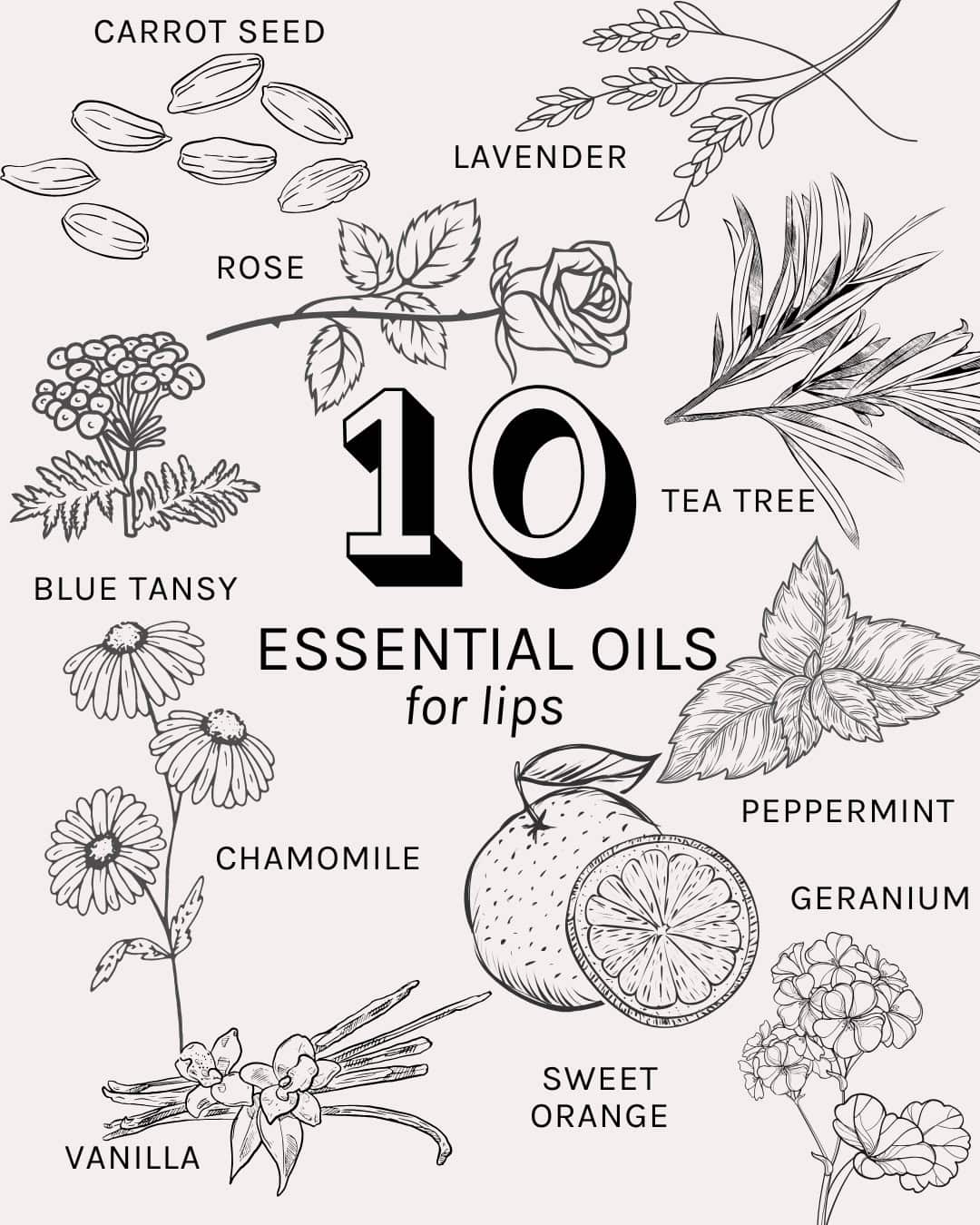
1. Carrot Seed Essential Oil
Why It’s Great: Carrot seed oil is packed with antioxidants and vitamins, especially beta-carotene, which helps repair damaged lips, protect from environmental stress, and promote healing. It's especially great for healing dry, cracked lips and adding a touch of youthful suppleness.
How to Use:
- Anti-Aging Lip Balm: Add 1–2 drops to a lip balm recipe with coconut oil and beeswax to protect and repair lips.
- Nourishing Lip Mask: Mix 1 drop of carrot seed oil with mashed avocado and honey for a 15-minute repairing lip mask.
- Daily Lip Serum: Combine 1 drop with rosehip oil and apply nightly for smoother, softer lips.
- Tinted Lip Gloss: Blend a drop into a lip gloss base with beetroot powder for a natural tint and protective benefits.
2. Lavender Essential Oil
Why It's Great: Lavender also contains powerful soothing and skin-healing properties within its chemical makeup, making it an excellent choice for soothing dry, chapped lips, cold sores, and irritated skin.
Lavender oil’s regenerative, restorative, antibacterial, and antioxidant properties make it a popular choice for remedying dry skin and helping to protect it from aging by neutralizing harmful free radicals [source].
How to Use:
- Soothing Lip Mask: Combine with honey and aloe vera for a gentle treatment.
- Healing Balm: Add to a lip balm recipe for chapped lips.
- Lip Serum: Mix with jojoba oil for a nourishing daily lip serum.
3. Rose Essential Oil
Why It’s Great: Rose is useful for all skin types, has anti-aging potential, and provides a gorgeous aroma [source]. It hydrates, soothes, and adds a luxurious floral scent. Even 1 or 2 drops will be highly beneficial for rejuvenating and helping to return that youthful glow to your skin and lips.
If you find a cheap bottle of rose, even if the label claims it to be an essential oil, it’s possible it’s a fragrance oil without any healing benefits [source]. So make sure to read your labels carefully.
How to Use:
- Nourishing Balm: Combine with coconut oil for a hydrating balm.
- Tinted Gloss: Mix with beetroot powder for a naturally tinted lip gloss.
- Anti-Aging Mask: Blend with avocado and honey for a smoothing treatment.
4. Blue Tansy Essential Oil
Why It’s Great: Blue tansy is known for its calming, anti-inflammatory, and antioxidant properties, making it perfect for soothing irritated or chapped lips. Its subtle floral scent adds a touch of luxury to your lip care.
How to Use:
- Soothing Lip Balm: Add 1–2 drops of blue tansy oil to a DIY lip balm with shea butter and beeswax for extra nourishment.
- Calming Lip Serum: Mix a drop of blue tansy oil with jojoba oil for a hydrating overnight lip treatment.
- Restorative Lip Mask: Combine 1 drop of blue tansy oil with aloe vera gel and honey for a soothing 10-minute lip mask.
- Gentle Lip Gloss: Add a drop to a clear gloss base for hydration with a hint of luxury.
5. Tea Tree Essential Oil
Why It’s Great: Tea tree oil’s antifungal, antiseptic, and anti-inflammatory properties not only help to clear the skin of blemishes, but it can also stimulate the immune system, helping to resolve skin inflammation and revitalizing the skin [source].
For these reasons, we like to put tree tea oil into action for repairing and moisturizing dry and chapped lips.
How to Use:
- Healing Balm: Add a drop to shea butter and honey for a repairing balm.
- Soothing Gel: Blend with aloe vera gel for a healing lip treatment.
- Exfoliating Scrub: Use in a lip scrub to treat damaged lips.
6. Chamomile Essential Oil
Why It’s Great: Chamomile reigns supreme as an option for soothing dry, chapped skin [source]. While there are several different types of chamomile, and any of them will work, if you can find German chamomile (Matricaria recutta), it’s the best choice if you want your lips to regain their softness.
Chamomile soothes sensitive lips, reduces inflammation, and contains antifungal and antibacterial properties to soothe irritated skin.
How to Use:
- Calming Treatment: Blend with aloe vera gel for a soothing mask.
- Healing Balm: Add to coconut oil and beeswax for a nourishing lip balm.
- Daily Serum: Use in a jojoba oil-based lip serum to treat dryness.
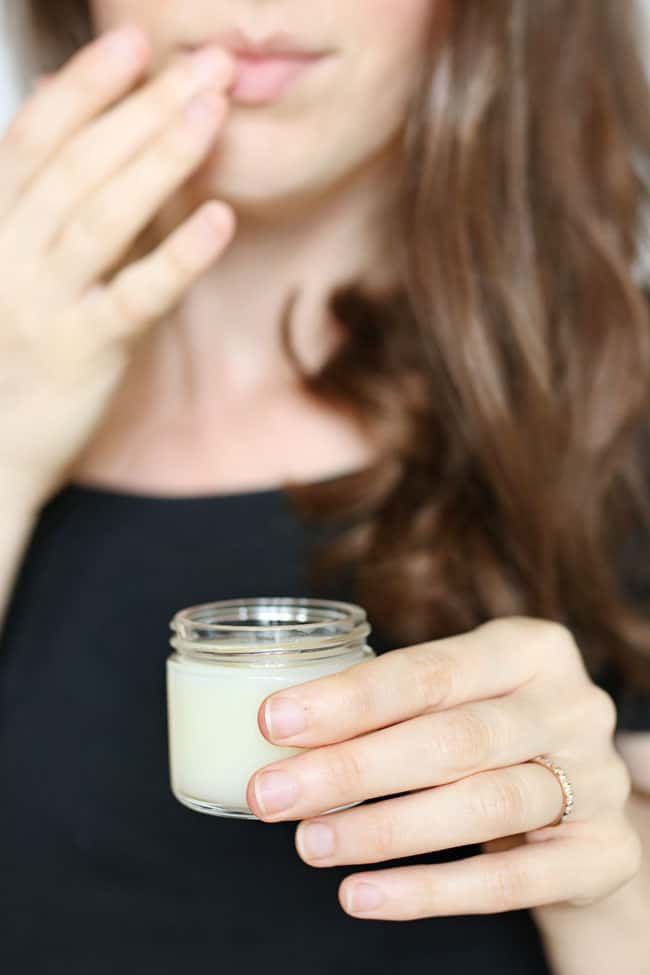
7. Geranium Essential Oil
Why It’s Great: Moisturizes and promotes healing of cracked or dry lips.
Geranium (Pelargonium graveolens) is a sweet, floral, refreshing, and uplifting essential oil that, like lavender, also has soothing anti-inflammatory and regenerative properties for the skin. This is an excellent option for creating a lip balm.
Geranium has been found to improve blood circulation and is both moisturizing and regenerative for dry skin [source]. It has significant antimicrobial, antioxidant, and anti-inflammatory properties [source].
We reach for these essential oils to reduce inflammation because they’re invaluable for treating dry, chapped lips, often caused by our immune system’s response to a threat, aka inflammation.
How to Use:
- Repairing Mask: Mix with shea butter and honey for a healing treatment.
- Daily Lip Serum: Add to jojoba oil for a hydrating serum.
- Hydrating Balm: Use in a DIY lip balm for soft, smooth lips.
8. Peppermint Essential Oil
Why It’s Great: Provides a cooling sensation, soothes dryness, and stimulates circulation for plumper lips. Peppermint oil contains menthol, which gives a refreshing, tingly effect and boosts blood flow, enhancing the natural color and fullness of your lips.
How to Use:
- Cooling Lip Balm: Add 1–2 drops to a DIY lip balm for a refreshing tingle.
- Lip Scrub: Mix with coconut oil and sugar for a cooling, exfoliating scrub.
- Overnight Mask: Blend with shea butter for a hydrating overnight lip mask.
9. Vanilla Essential Oil
Why It’s Great: Adds a comforting scent and softens lips. Vanilla is rich in antioxidants, which help protect your lips from environmental damage while adding a touch of luxurious fragrance to your lip care products.
How to Use:
- Nourishing Balm: Combine with coconut oil for a moisturizing balm.
- Sweet Scrub: Mix with sugar and honey for a delicious exfoliating scrub.
- Scented Lip Butter: Add to shea butter for a soothing lip butter.
10. Sweet Orange Essential Oil
Why It’s Great: Brightens lips and adds a zesty, uplifting flavor. Sweet orange oil contains Vitamin C, which can help protect and rejuvenate lips, leaving them soft and radiant.
How to Use:
- Citrus Lip Balm: Add 1–2 drops to a lip balm for a fresh scent.
- Exfoliating Scrub: Blend with sugar and olive oil for a gentle scrub.
- Refreshing Mask: Combine with shea butter and honey for a revitalizing lip mask.
Essential Oils To Avoid For Your Lips
Yes, there are some essential oils that you want to avoid applying to your lips. For instance, you should stay away from sensitizing essential oils such as lemongrass, cinnamon, nutmeg, clove, sage, oregano, allspice, or cassia as they can cause skin irritation.
And although they smell absolutely gorgeous and have very uplifting energy, some citrus oils (some types of lemon, lime, and bergamot) are photosensitizing [source]. That means they can cause a sunburn on your skin and lips if applied before direct exposure to the sun. When using these oils on your body, it’s best to avoid applying citrus oils directly before sun exposure, so using them at night is best.
Non-phototoxic citrus options
- Use citrus oils like sweet orange, tangerine, or mandarin that are non-phototoxic, use with bergamot FCF version, or look for steam distilled lemon or lime.
FAQ
Sweet almond or jojoba are two excellent carrier oil options. For essential oils, carrot seed oil, rose essential oil, geranium essential oil, and lavender essential oil are at the top of the list.
Peppermint is a potent oil, and it can cause allergic reactions and increased dryness [source]. Not realizing the cause, some people keep using that lip balm and perpetuating a cycle of lip dryness.
Yes, it is safe so long as you apply the proper quantities of essential oils diluted in a carrier oil or base oil, like the ones we suggest in this article's recipes. Avoid sensitizing and phototoxic essential oils.
Above, we’ve highlighted some of the best combinations in our lip balm recipes, but if you don’t have or aren’t able to source those ingredients, you can replace them with olive oil, hemp seed oil, coconut oil, or sunflower oil.
There are definitely times when applying tea tree can be helpful — think of stings, bites, or acne as a few examples. Still, it won’t produce better results if you lather your lips with tea tree essential oil—honestly, it won’t taste very good either.
However, using a drop or two in the overnight lip mask recipe or in place of another oil in one of the other recipes is safe to try.
Patchouli can be safely added to a homemade lip balm as long as it’s not used in exaggerated amounts. One or two drops are enough.
You can heal chapped lips faster by applying lip balm (including a homemade one) several times a day, and also before bed.
References
- Srivastava J, et al. Chamomile: a herbal medicine of the past with bright future. Mol Med Report. 2011.
- Prusinowska R, et al. Composition, biological properties and therapeutic effects of lavender (Lavandula angustifolia L.): a review. Herba Polonica. 2014.
- Pazyar N, et al. A review of applications of tea tree oil in dermatology. Int J Dermatol. 2013.
- Lahkar S, et al. An overview on tea tree (Melaleuca alternifolia) oil. Int J Pharm Phytopharmacological Res. 2013.
- Saraswathi J, et al. Phytopharmacological importance of Pelargonium species. J Med Plant Res. 2011.
- Narnoliya LK, et al. The phytochemical composition, biological effects and biotechnological approaches to the production of high-value essential oil from geranium. Essential Oil Research. 2019.
- Boskabady MH, et al. Pharmacological effects of Rosa Damascena. Iran J Basic Med Sci. 2011.
- Ahmed Y, et al. Rosa Damascene Mill. (Rose): a versatile herb in cosmetology. CellMed. 2019.
- Kim K, et al. Phototoxicity: its mechanism and animal alternative test methods. Toxicol Res. 2015.
- Peppermint oil. NIH National Center for Complementary and Integrative Health website. Updated October 2020.

